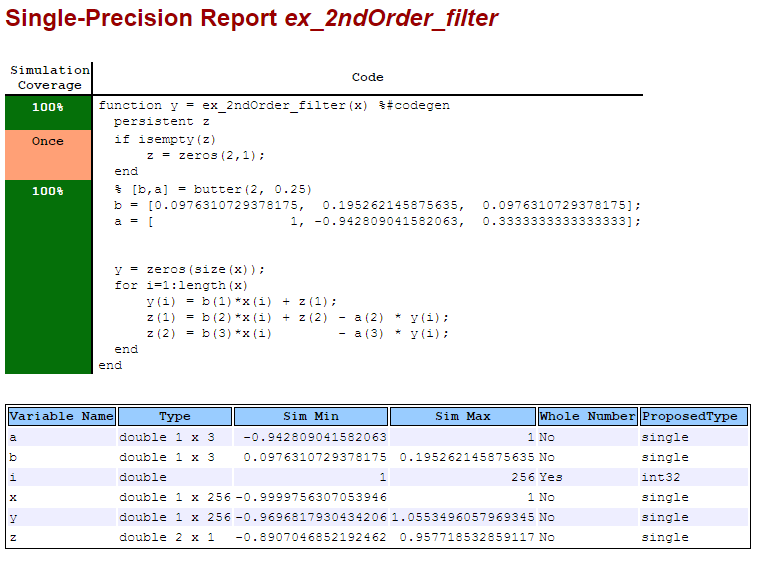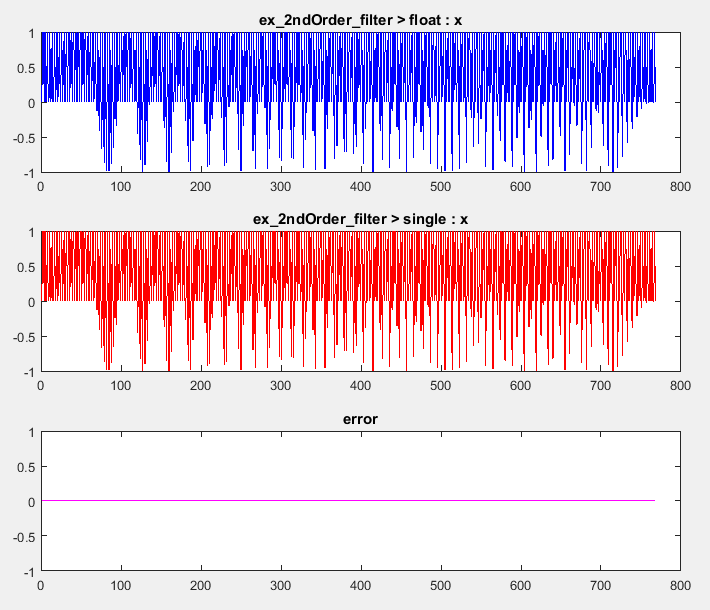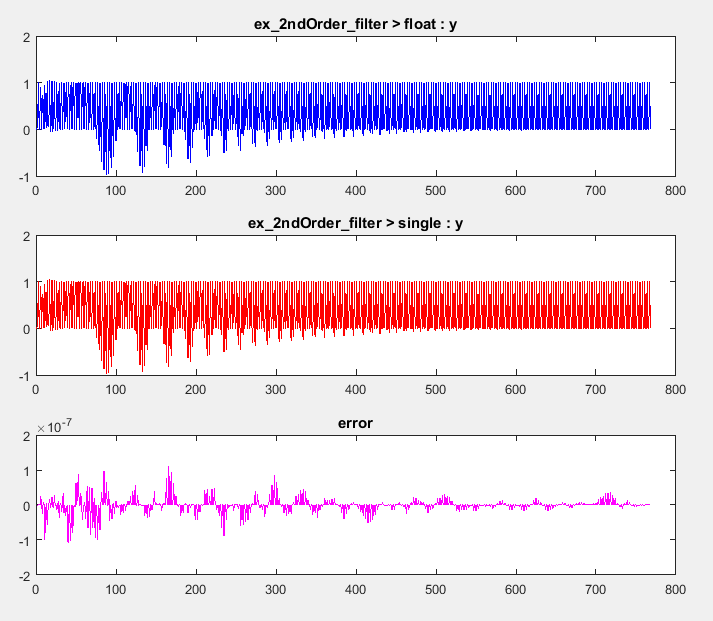This example shows how to generate single-precision MATLAB® code from double-precision MATLAB code. This example shows the single-precision conversion workflow that you use when you want to see single-precision MATLAB code or use verification options. Optionally, you can also generate single-precision C/C++ code.
To complete this example, install the following products:
MATLAB
MATLAB Coder™
Fixed-Point Designer™
C compiler
See Supported Compilers.
You can use mex -setup to change the default compiler.
See Change Default Compiler (MATLAB).
Create a local working folder, for example, c:\ex_2ndOrder_filter.
Change to the docroot\toolbox\fixpoint\examples folder.
At the MATLAB command line, enter:
cd(fullfile(docroot, 'toolbox', 'fixpoint', 'examples'))
Copy the ex_2ndOrder_filter.m and ex_2ndOrder_filter_test.m files
to your local working folder.
| Type | Name | Description |
|---|---|---|
| Function code | ex_2ndOrder_filter.m | Entry-point MATLAB function |
| Test file | ex_2ndOrder_filter_test.m | MATLAB script that tests |
Create a single-precision configuration object. Specify the test file name. Verify the single-precision code using the test file. Plot the error between the double-precision code and single-precision code. Use the default values for the other properties.
scfg = coder.config('single'); scfg.TestBenchName = 'ex_2ndOrder_filter_test'; scfg.TestNumerics = true; scfg.LogIOForComparisonPlotting = true;
To convert the double-precision MATLAB function, ex_2ndOrder_filter,
to single-precision MATLAB code, use the codegen function with the -double2single option.
codegen -double2single scfg ex_2ndOrder_filter
codegen analyzes the double-precision
code. The conversion process infers types by running the test file
because you did not specify the input types for the ex_2ndOrder_filter function.
The conversion process selects single-precision types for the double-precision
variables. It selects int32 for index variables.
When the conversion is complete, codegen generates a type
proposal report.
To see the types that the conversion process selected for the
variables, open the type proposal report for the ex_2ndOrder_filter function.
Click the link ex_2ndOrder_filter_report.html.
The report opens in a web browser. The conversion process converted:
Double-precision variables to single.
The index i to int32.
The conversion process casts index and dimension variables to int32.

To view the report for the generation of the single-precision MATLAB code, in the Command Window:
Scroll to the Generate Single-Precision Code step.
Click the View report link.
In the MATLAB Source pane, click
ex_2ndOrder_filter_single.
The code generation report displays the single-precision MATLAB code
for ex_2ndOrder_filter.
When you generate single-precision code, codegen enables highlighting of potential
data type issues in code generation reports. If codegen cannot remove a double-precision
operation, the report highlights the MATLAB expression that results in the operation. Click the Code
Insights tab. The absence of potential data type issues indicates that
no double-precision operations remain.
You can see the comparison plots for the input x and
output y because you selected to log inputs and
outputs for comparison plots .


If you also want to generate single-precision C code, create
a code configuration object for C code generation. Use this configuration
object with the -config option of the codegen function.
For example:
Create a code configuration object for generation of a C static library.
cfg = coder.config('lib');
Generate the C code. Enable generation of the code generation report.
codegen -double2single scfg -config cfg ex_2ndOrder_filter -report
To view the code generation report for the C code generation, click the View Report link.
In the Generated Code pane, click
ex_2ndOrder_filter.c.
Double-precision variables have type float in
the C code.
The index i is an integer.
When you generate single-precision code, codegen enables
highlighting of potential data type issues in the code generation
report. If codegen cannot remove a double-precision
operation, the report highlights the MATLAB expression that results
in the operation.
Click the Code Insights tab. Then, expand Potential data type issues. The absence of double-precision operations indicates that no double-precision operations remain.
codegen | coder.SingleConfig | coder.config